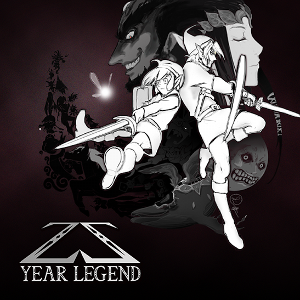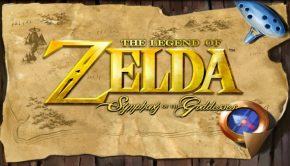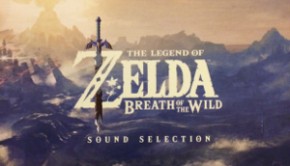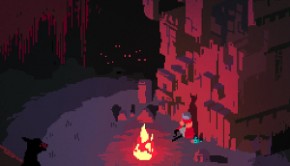The Legend of Zelda Indie Composer Tribute -25 Year Legend-
 |
Album Title: 25 Year Legend: A Legend of Zelda Indie Composer Tribute |
| Record Label: OverClocked ReMix |
|
| Catalog No.: OCRA-0029 |
|
| Release Date: November 22, 2011 |
|
| Purchase: Download at OverClocked ReMix |
Overview
The Legend of Zelda series is home to some of gaming’s most well-known and beloved themes, and is no stranger to remixes from fans and industry professionals alike. Back in 2011, at the height of The Legend of Zelda 25th Anniversary celebration, OverClocked Remix released quite an ambitious project to celebrate this venerable series. Appropriately titled 25 Year Legend: A Legend of Zelda Indie Composer Tribute, this hour long album was started as a small concept from composer Roger Hicks (also known as Rekcahdam), who expanded it to include some pretty big names in the indie game community, including Disasterpeace (Fez), Laura Shigihara (Plants Vs. Zombies), Josh Whelchel (The Spirit Engine), C418 (Minecraft), and more. Each composer brings their own style to the table, making this album a very unique one to listen to.
Body
Diasterpeace’s “Chamber of the Goddess” opens up the album, being a straightforward re-arrangement of “The Great Fairy Fountain” and “Triforce Chamber” from A Link to the Past, but Disasterpeace adds this very 70’s mellow sound to it, making it a very relaxing and very lovely listen. MisfitChris continues the downbeat approach with a laid back remix of “Kakariko Village,” featuring some woodwind and chiptune instrumentation. The source material is barely altered in any musical way, and although it sounds lovely, and very true to the original version, it really doesn’t try to do anything special. Of course, maybe it doesn’t really need to either. Laura Shigihara offers “Fushigina Forest,” a piano arrangement of “Lost Woods” from A Link to the Past. It sounds absolutely gorgeous, and Shigihara adds enough to the arrangement to make it both melodic and highly original. Among mellow addition, “Skyward,” is a rearrangement of the main theme to Skyward Sword courtesy of C418 of Minecraft fame. It’s a slow, adagio-like piano arrangement, that despite its simplicity and mournful like changes, works very well and is beautifully done.
Moving to some personal faves, “Hoy, Small Fry!” by HyperDuck SoundWorks (best known for the soundtrack to Dust: An Elysian Tail) is a lovely rearrangement of “The Wind Waker Main Theme”, being soft but pronounced, and using several instruments that actually fit the source material. There’s some intelligent theme incorporation here and there, playing around with “Zelda’s Lullaby,” “Aryll’s Theme,” and even “Kakariko Village.” It works great, and is easily a highlight of the album. “Ballad of the Wind Fish (Kaze no Sakana Mix)” by Dong, shines brightly as one of the best rearrangements I’ve heard of the classic tune from Link’s Awakening. For starters, the tropical and piano oriented instrumentation really meshes well with the source material, but Dong goes the extra mile and adds Japanese lyrics to the song, expanding the song’s original intent. The vocals, although somewhat standard for the type of music Dong was going for, really sound quite good, and best of all, give the song an original feel that it’s never had before.
Jeff Ball introduces the first dance remix of the album, “Labyrinth of Dance Floors,” the “Light World Dungeon,” from A Link to the Past redone as a trance-like dance mix. Despite the repetitive nature of the source material, and the track’s 7-minute length, it actually works rather well, and Ball does enough to play along with the track. However, he strangely throws a live violin line (the “Secret Found” jingle from most Zelda games) at the very last second, instead of actually incorporating the violin throughout the track. Mattias Häggström Gerdt offers “Hey, Listen,” a funky remix of The Legend of Zelda main theme, and “Songs of Storms/Windmill Hut.” It all sounds great and gives the themes a spark of originality…right before the song transitions abruptly into dubstep, which sounds fine, but is very jarring just a tad bit amateurish, as the song was decent as it was before the transition. “Last Dance of the Giants” is another dance remix on the album, this time by Kozilek (Luftrausers), mixing in the “Song of the Giants” from Majora’s Mask. It has a very dark and solemn atmosphere that strangely works in this beat infused mix, however unlike the earlier “Labyrinth of Dance Floors,” this mix actually does get highly repetitive by the time it’s over, especially due to the way it was arranged.
Reckcahdam’s own contribution is“Gimme My Sword!” which uses the very short melody of “Seek the Sword” from Link’s Awakening, using both a piano and rock guitar instrumentation for the melody and backing chords respectively. It sounds great at first, transitioning from instruments to chiptune and then back again. Reckcahdam also intelligently spices up the theme by adding slight echoes of other famous Zelda themes, “Zelda’s Lullaby,” “Lost Woods,” “Great Fairy Fountain,” and others. However, the song suddenly transitions into the “Opening Demo” from A Link to the Past, and adds vocal samples from the original (and very cheesy) NES Zelda commercial, along with Navi saying “Hey, listen!” For some this will either sound nostalgic, or just annoying. It’s a very strange musical choice overall.
Joshua Morse (known for various remix albums along with FZ: Side Z, Onslaught! and others), comes in with “Link’s Epoch,” an arrangement of “The Legend of Zelda Main Theme,” containing somewhat of a laid back feel, while incorporating some Arabic and Latin elements. It doesn’t quite work however, and the arrangement really doesn’t go anywhere, making it immediately forgettable, even as Morse tries to add in a reference to “Zelda’s Lullaby.” Among other disappointments, we get somewhat of an odd one-off arrangement with Air & Sea’s “To Everything There is a Temple of Seasons,” an arrangement of a very short theme from Oracle of Ages/Seasons. It’s a very random choice, and bold for doing a lesser known theme to a portable Zelda game. Air & Sea plays around with the song a bit, having this 60s trance feel to it, but ultimately the song is too short to really do anything with.
“Song of Storms/Windmill Hut” from Ocarina of Time is no stranger to remixes, being a fan favorite, with one of the catchiest themes in all of the Zelda musical canon. However, Jimmy Henson (alias, Big Giant Circles, known for his work on Mass Effect 2, The Blinding of Isaac, and Call of Duty: Black Ops II) comes up with a very original sounding, and pretty epic remix of the theme with his “Thunderstruck.” Being a combination of chiptune, dubstep, rock, and featuring a gorgeous violin performance by Jeff Ball, “Thunderstruck,” may very well be the best arrangement on this album, and is certainly the most dynamic one of the bunch. That said, easily the worst of the bunch comes straight after: Josh Whelchel’s (Super Meat Boy!, FZ: Side Z) “Zelda’s First ‘Trip’ to the Village.” Although it uses the popular “Gerudo Valley” theme as its main melody line, while incorporating several other known Zelda themes, Whelchel obnoxiously mixes in vocal samples of the announcer and audience from Super Smash Bros. Melee chanting Link and Zelda’s names, slowing it down, while also using vocal samples of both characters. What results is a cacophonous mix that does little to add to the preexisting music, and in fact detracts from it.
“Lon Lon Ranch (CTPLR Mix)” starts off quietly, and works as a solid re-orchestration of this beloved theme…and then halfway through it grows all too dramatically, deviating drastically from the original song. Although it fits thematically (considering the events of Ocarina of Time), it is off-putting just as an interlude in the middle of an, otherwise, smooth rearrangement. “Link’s Final Battle” from SoulEye is perhaps the oddest and most misplaced track on the album. It starts out with ambient sounds of Link running in a thunderstorm before entering a cave and engaging in combat against a monster. The music then kicks in, becoming an arrangement of “Battle Screen” from Zelda II: The Adventure of Link. The quality of the samples used is unfortunately quite low, and the volume has been mixed just a tad too softly. The track tries to enter into some variations, but ultimately sound too cheesy. It’s a shame, especially because the ambience at the beginning actually had quite a good build-up and sounded great.
Coming towards the end of the album, “Ilia’s Adagio Meets Dark March” is a very strange track, not necessarily because of how it was arranged, but because of the tracks used. Gryzor87 (Hydorah) uses an orchestral approach on “Ilia’s Theme,” from Twilight Princess and makes it lead into “The Dark World” from A Link to the Past. The arrangement works pretty well, especially during the “Ilia’s Theme” portion of the song, but as soon as we move into “The Dark World,” the quality of the orchestral synths become all too apparent, and it just doesn’t sound too good, having an old Casio keyboard feel to it. We come to the last track on the album, “Zelda’s Graceful Nightmare,” by Matheus Manente (Hydorah, Rokko Chan). This medley goes through the gambit of themes from Ocarina of Time, Majora’s Mask, and one theme from The Wind Waker, and is mostly rock-guitar based. It’s a serviceable final track, but like some tracks on this album, it doesn’t really do much to change up or incorporate other themes, to say nothing that the tracks selected in this medley don’t make much sense thematically.
Summary
25 Year Legend is an interesting indie infused experiment that carries some pretty big names in indie game composing along for a retrospective of the Zelda series. Unfortunately, it suffers from a clear direction, and is at times just a very repetitive listen. While some tracks here are completely forgettable, some actually work very well and can even represent the best in Zelda remixes. The album is free to download from OverClocked ReMix’s website, and is worth a listen due to the various highlights I mentioned. Just don’t expect to come back to the full thing very often, as there are just too many lackluster tracks on display here as well.
Do you agree with the review and score? Let us know in the comments below!
3
Posted on November 2, 2014 by Julius Acero. Last modified on January 17, 2016.














